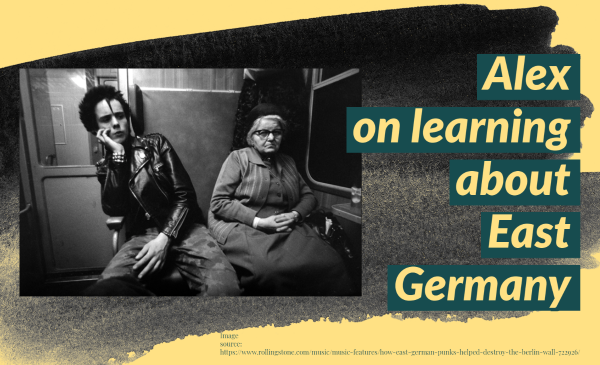11.15.2021 – Alex on learning about East Germany
11.15.2021: Alex on learning about East Germany

Day to day life in East Germany in the 1980s was a mystery to me before I saw the documentaries Flüstern und Schreien (Dieter Schumann, 1988) and Unsere Kinder (Roland Steiner, 1989). Both of these documentaries were filmed in East Germany about underground subcultures. I have learned about life in East Germany and the Soviet bloc through various lenses but never once a lens that focused on everyday life. I learned about rock bands and how young adults would follow these bands and go to concerts in Flüstern und Schreien. An interesting perspective was shown in Unsere Kinder by interviewing young adult Neonazis and Skinheads and their families. By watching these two documentaries together, I saw two different reactions to the state surveillance and police persecution in East Germany in the 1980s. Some young people reacted by turning to music and lived fairly normal lives. Others went down a darker path of hatred towards people they saw as different–just as the police singled them out for being different. However, not everyone interviewed in the documentaries was a rocker or skinhead. It was interesting to me to see “normal” people — parents, police, trade workers and bakers — talk about these subcultures. All of the “normal” people rightfully hated the skinheads and Neonazis because of their ideologies. On the other hand, many people who did not belong in these subcultures, liked having the concerts because they felt it was a good outlet for young people to enjoy themselves.
Even though I live about halfway across the world and forty years apart from the people in the documentaries, I could relate to some of them. For example, I related to the boredom that many young people talked about when they said there was nothing to do but go to concerts in Flüstern und Schreien. I am from Ohio, and I constantly feel that lingering boredom of having nothing to do when I am back home. Concerts gave the youth something to do besides going to school, apprenticeships or work. The documentary highlights how the rock band subculture really brought adventure to many of the people in East Germany. The concerts gave people a reason to go to different cities and villages and enjoy life.
Another aspect I found interesting was how the Neonazis and skinheads said that they felt targeted by the police because of the way they looked, and so they adopted increasingly radical views as a way to protest. The Neonazis and skinheads often started off as punks who liked to dress and wear makeup that was out of the ordinary because they wanted to rebel against the system. This caused the police to question them a lot. The harassment by police twisted these young adults into radicalized anti-socialist, antisemetic and racist people. The Neonazis and skinheads interviewed were young adults whose parents were alive during the Nazi regime. These young adults had direct warnings of the evils of antisemitism and racism, but still had these awful thoughts that twisted their brains and made them hate and attack people.
While I do understand that constant supervision and harassment by police is a terrible way to live, there are other ways to react to this, some of them positive. A young woman was interviewed in Flüstern und Schreien who was a punk and enjoyed rock music. She received the same surveillance the skinheads did because of the way she looked. However, she had her own views that accepted everyone, despite the surveillance she underwent. She passionately retorted that the skinheads were not accepted in the rocker scene and that their hatred had no place in Germany. The young woman was one of my favorite interviewees because I totally agree with her. Hate has no place in Germany, whether in the East or West and it is the job of every person to fight against the terrible racist and antisemetic rhetoric and thought that is still persisting today. The young lady dealt with the supervision because it was simply part of life in East Germany. A lot of people were just trying to live their lives, with the circumstances that they were placed in.
Watching these documentaries has given me an interesting insight into thinking about what we learn in class. While we talk about these grand historical events and time periods, life for everyday people still happens around these events. I think learning their stories humanizes history and also helps us not repeat it. You can watch these documentaries on the Goethe on Demand website for free.
-Alex